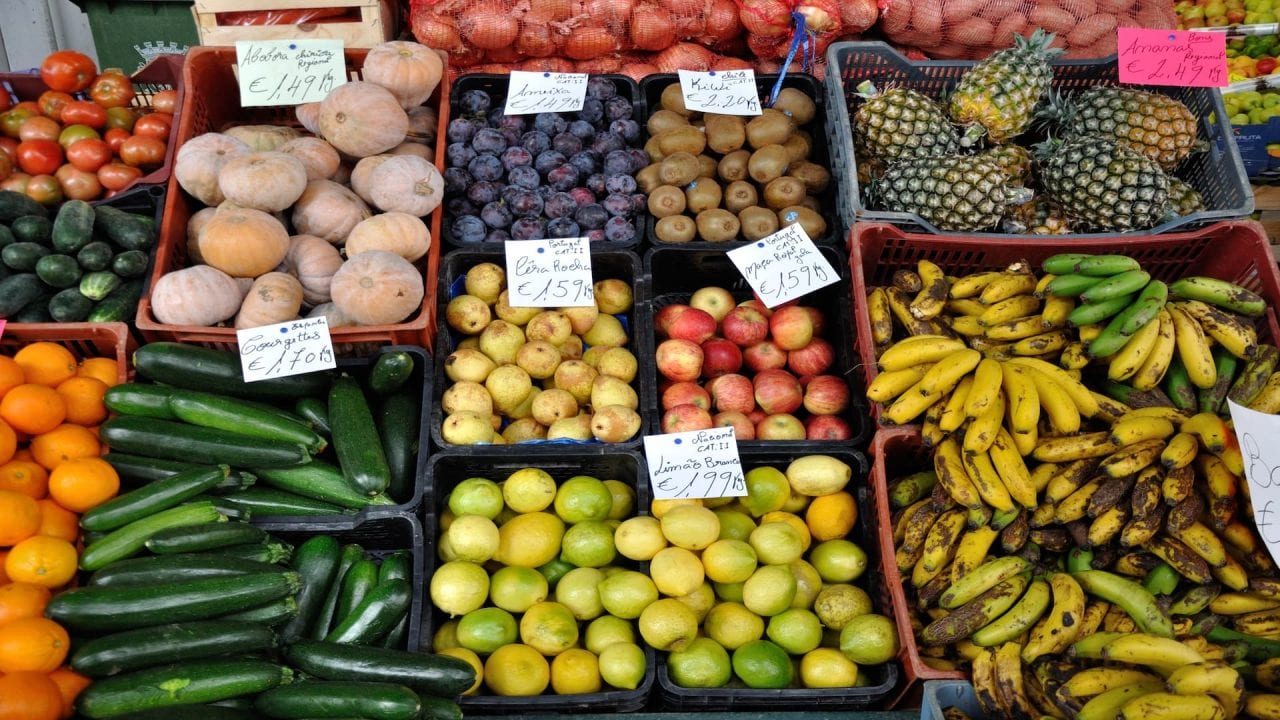From its humble beginnings to impressively creative innovations, Portuguese cuisine has always focused on simple techniques that highlight the natural flavours of quality ingredients. Here are some of the most typical Portuguese dishes you should be on the lookout for as you eat your way through Portugal.
Typical Portuguese Food
Bread, sausages, seafood, olives, and pastries remain staples throughout Portuguese cuisine, but as you travel across the country, you’ll see how different regions have perfected their own methods of preparing these beloved ingredients. The Portuguese are known for their creativity while coming up with their own unique dishes based on what is available locally.
Typical Portuguese Northern Food
Tripas à Modas do Porto
You’ll often see this rich stew described as Porto’s official dish. It is a combination of cow tripe, smoked meats and white beans, enhanced with cumin, curry, and cloves, and typically served with rice. It is said that this dish arose out of necessity when the people of Porto had given all their choice cuts of meat to feed the sailors when Henry the Navigator set out to conquer North Africa. Nevertheless, the dish had endured and has become a proud regional favourite.
Feijoada à Transmontana
Trás-os-Montes, a region in the top right corner of the country, proudly claims to be the original creator of feijoada, a bean stew that is popular throughout the country. The additional ingredients vary depending on where the stew is being prepared, but in the north, you can expect to see red beans, sausage, and cabbage. This is good reliable comfort food on a chilly winter day.
Arroz de cabidela
View this post on Instagram
This one has the potential to do damage if you wait until after you’ve ordered to put that Google Translate to use. So be warned, arroz de cabidela is a rice dish made with chicken or game that is cooked in its own blood. Finished off with some vinegar, it ends up being a rich and incredibly flavourful dish. Although some might be turned off by the mention of blood, it is important to remember that the Portuguese pride themselves on using the entire animal and making sure nothing goes to waste. If you’re planning a visit to Porto, I highly recommend this 3-hour food and tasca tour and have lunch with the locals. If you are planning your holiday to Portugal now, make sure you subscribe to our newsletter for all the best advice and tips for travelling around Portugal.
Typical Portuguese Central Food
Oysters
View this post on Instagram
In addition to being one of the only places in Portugal that you can go for a gondola ride, the Aveiro estuary is also home to some of Portugal’s most delicious oysters. These coveted treats can be found throughout Aveiro and the nearby region in small local eateries. There will be no doubt about the freshness, and you can likely enjoy a dozen oysters and a bottle of local sparkling wine for a fraction of the price you’d expect to see back home. By the way, if you still haven’t been to Portugal’s Venice a.k.a. Aveiro, than you should start thinking about it. We’ve been there and this is what we had to say.
Bucho
Rich, hearty, and not for the faint of heart, bucho is a savoury blend of rice and pork meat, that is cooked inside of a pig’s stomach. This might sound a bit scary to those unaccustomed to this method of cooking, but it really does make for an incredibly flavourful and comforting dish that highlights the innovative techniques of Portuguese cuisine.
Carapaus
View this post on Instagram
These tasty treats are a common way to begin a meal in central Portugal. They are dried Atlantic mackerel that have spent just a few hours drying out in the sun before being seared in olive oil and smothered with lots of garlic. Simple, delicious, and perfect for sharing. If you’re in Lisbon savour the flavours of the Portuguese cuisine with the help of this Gourmet Walking Tour and Tastings.
Typical Portuguese Food in Alentejo
Bacalhau com broa à Alentejana
View this post on Instagram
Pretty much every Portuguese region (if not every Portuguese family) stakes claim to at least one special cod dish. In the Alentejo, it is bacalhau com broa, or cod baked with cornbread. Topped off with delicious local olive oil, this makes for a rich and satisfying staple of Portuguese cuisine.
Carneiro assado
You’ll see pork everywhere in Alentejo, but they also deserve some credit for the lovely lamb dishes prepared in the region. This roasted lamb dish is served with baked or fried potatoes and a medley of vegetables. It is perfect for a comforting family-style meal on a lazy Sunday afternoon.
Coelho à caçador à Alentejana
Game is also frequently found on the menu in Alentejo. The recipe for Hunter’s Rabbit with vary in every family, but will alwaus feature the hunter’s catch seasoned with local herbs, wine, and simmered for a good long time in a clay or iron pot. This rich stew is usually accompanied by boiled potatoes and bread to soak up the juices.
Sopa de tomate Alentejana
Vegetarians might find themselves short on options in the Alentejo. For that reason, coming across the Portuguese answer to Spanish gazpacho can come as a welcome relief. Alentejo has beautiful locally grown tomatoes and local cooks turn them into wonderfully flavourful soups, both hot and cold, that highlight the naturally sweet flavour of this produce superstar. Spend a day in Évora, discovering its many wonders and rich Alentejo cuisine with this Get Your Guide Tour. Lunch and wine included.
Typical Portuguese Food in The Algarve
Cataplana
View this post on Instagram
Cataplana refers both to the pot itself and the delicious meal that is contained inside. These traditional Algarverian pots are shaped like clams with a hinged lid and are usually made from brass or copper. The dish is cooked, served, and eaten from the same pot and can vary from fish, shellfish or meat to a mixture of all three. Fishing towns, like Olhão and Lagos, are famous for their delicious Cataplana dishes made with the daily catch of various fish, shellfish and squid. Discover everything about Lagos with one of bePortugal’s comprehensive guides.
Amêijoas à Bulhão Pato
View this post on Instagram
When you have an abundance of super fresh seafood in Portugal, there is really no need to complicate things. Portuguese cuisine Algarve-style is all about showing off the local bounty and I recommend enjoying as much of it as you can while you are there. Amêijoas, or clams, are cooked simply in garlic and olive oil, preserving their wonderful freshness. Best enjoyed by the beach and washed down with a cold beer. You really can’t go wrong.
Cenouras à Algarvia
These are easy to miss, as they don’t appear to be much more than boiled carrots, but once you’ve tasted them, you’ll understand why they made the list. They are often served as a starter, or couvert, alongside bread and olives at the beginning of the meal. Simple Portuguese cuisine at its finest, these farmer’s carrots are enhanced with a little garlic, a splash of vinegar and olive oil, then finished off with a sprinkle of oregano and cumin. Easy, fresh, and oh so delicious. Taste the best Algarvian cuisine with this 3-hour Algarve classic food tour.
Should you try our Typical Portuguese cuisine?
As you can see, regardless of which part of the country you find yourself in, Portuguese cuisine has plenty to offer any palate. Whether you’re looking for a culinary adventure or simply to enjoy some delicious local bounty, you won’t be disappointed. Wherever you end up eating, talk to the waiters and ask about house specialities. The Portuguese are proud of their culinary traditions and will be happy to point you in the right direction.







